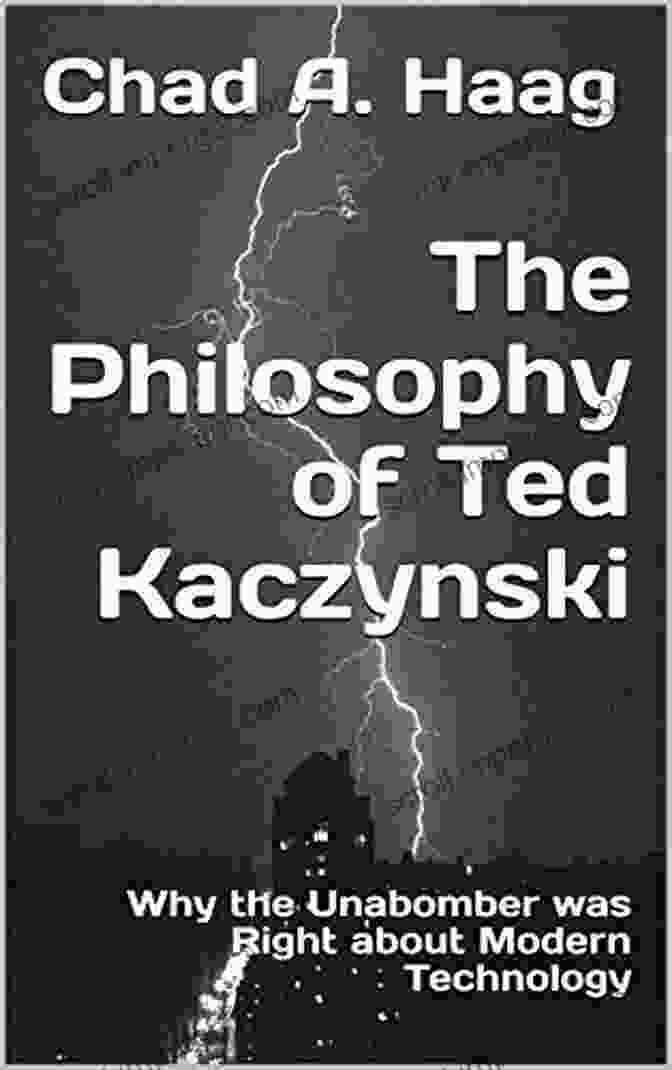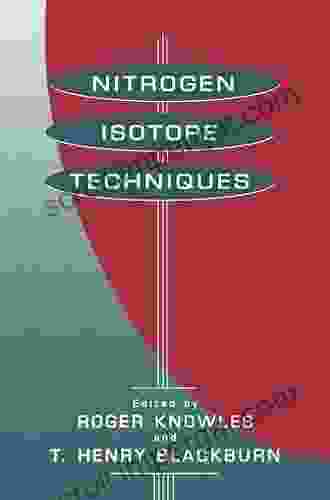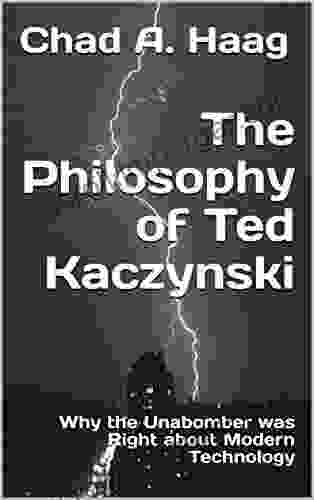Why the Unabomber Was Right About Modern Technology

4.5 out of 5
| Language | : | English |
| File size | : | 3426 KB |
| Text-to-Speech | : | Enabled |
| Screen Reader | : | Supported |
| Enhanced typesetting | : | Enabled |
| Word Wise | : | Enabled |
| Print length | : | 262 pages |
| Lending | : | Enabled |

In his groundbreaking book, 'Why the Unabomber Was Right About Modern Technology,' technology critic Andrew Bard reconstructs the life and ideas of the infamous Unabomber, arguing that his extreme views were rooted in a profound understanding of the dangers posed by modern technology.
The Unabomber, Ted Kaczynski, was a brilliant mathematician and computer scientist who turned to violence in the 1980s and 1990s to protest the increasing pervasiveness of technology in society. His targets were academics, scientists, and others he believed were complicit in the development and spread of technology.
Kaczynski was eventually captured and convicted of murder, but his writings have continued to fascinate and provoke people around the world. In 'Why the Unabomber Was Right About Modern Technology,' Bard argues that Kaczynski's ideas were not the ravings of a madman, but rather the product of a clear-eyed and rational analysis of the dangers posed by modern technology.
Bard examines Kaczynski's arguments about the ways in which technology is eroding human freedom, autonomy, and privacy. He also explores the Unabomber's critique of the modern industrial system, which he saw as a dehumanizing and environmentally destructive force.
Bard does not endorse Kaczynski's violence, but he argues that his ideas deserve to be taken seriously. He believes that we need to confront the dangers posed by modern technology and to develop ways to mitigate its negative effects.
'Why the Unabomber Was Right About Modern Technology' is a challenging and thought-provoking book that will force readers to reconsider their own views on technology. It is a must-read for anyone interested in the Unabomber, the history of technology, or the future of human society.
The Unabomber's Background and Beliefs
Ted Kaczynski was born in 1942 in Chicago, Illinois. He was a brilliant student, and he earned a PhD in mathematics from the University of Michigan in 1967. After graduating, he worked as a mathematician and computer scientist at the University of California, Berkeley.
In the early 1970s, Kaczynski became increasingly disillusioned with modern society. He believed that technology was eroding human freedom and autonomy, and he saw the industrial system as a dehumanizing and environmentally destructive force.
In 1971, Kaczynski left his job at Berkeley and moved to a remote cabin in Montana. He lived there for the next 20 years, working on his writings and preparing for a campaign of violence against those he believed were responsible for the destruction of the natural world and human freedom.
In 1995, Kaczynski was arrested for sending a series of letter bombs to academics, scientists, and others he believed were complicit in the development and spread of technology. He was eventually convicted of murder and sentenced to life in prison.
Kaczynski's writings have been widely read and debated. In his manifesto, 'Industrial Society and Its Future,' he argued that the only way to save humanity from the destructive effects of technology was to overthrow the industrial system and return to a more primitive way of life.
Bard's Argument
Andrew Bard argues in 'Why the Unabomber Was Right About Modern Technology' that Kaczynski's ideas were not the ravings of a madman, but rather the product of a clear-eyed and rational analysis of the dangers posed by modern technology.
Bard examines Kaczynski's arguments about the ways in which technology is eroding human freedom, autonomy, and privacy. He also explores the Unabomber's critique of the modern industrial system, which he saw as a dehumanizing and environmentally destructive force.
Bard does not endorse Kaczynski's violence, but he argues that his ideas deserve to be taken seriously. He believes that we need to confront the dangers posed by modern technology and to develop ways to mitigate its negative effects.
The Dangers of Modern Technology
Kaczynski argued that modern technology is eroding human freedom, autonomy, and privacy. He believed that computers and other technologies are making it easier for governments and corporations to track and control people. He also believed that the increasing use of technology is making people more isolated and lonely.
Bard agrees with Kaczynski that modern technology poses a number of dangers to human society. He argues that we need to be aware of these dangers and to take steps to mitigate their effects.
Bard is particularly concerned about the ways in which technology is being used to track and control people. He points to the widespread use of surveillance cameras, facial recognition software, and other technologies that can be used to monitor people's movements and activities.
Bard also argues that the increasing use of technology is making it easier for governments and corporations to control people's behavior. He points to the use of social media to spread propaganda and to manipulate people's opinions.
Bard believes that we need to take steps to protect our freedom and autonomy from the dangers posed by modern technology. He argues that we need to demand strong privacy laws and that we need to develop new technologies that are designed to protect people from surveillance and control.
The Dehumanizing Effects of the Industrial System
Kaczynski argued that the modern industrial system is dehumanizing and environmentally destructive. He believed that the industrial system is based on the exploitation of people and the natural world. He also believed that the industrial system is leading to the destruction of the natural world and the extinction of many species.
Bard agrees with Kaczynski that the modern industrial system has had a number of negative effects on human society and the natural world. He argues that the industrial system has led to the alienation of workers, the destruction of communities, and the degradation of the environment.
Bard is particularly concerned about the ways in which the industrial system is exploiting people and the natural world. He points to the use of sweatshops and child labor in the production of goods. He also points to the destruction of forests, rivers, and other natural resources.
Bard believes that we need to transition to a more sustainable and humane economic system. He argues that we need to develop new technologies that are less harmful to the environment and that we need to create a more just and equitable society.
Andrew Bard argues in 'Why the Unabomber Was Right About Modern Technology' that Kaczynski's ideas deserve to be taken seriously. He believes that we need to confront the dangers posed by modern technology and to develop ways to mitigate its negative effects.
Bard's book is a challenging and thought-provoking read. It is a must-read for anyone interested in the Unabomber, the history of technology, or the future of human society.
4.5 out of 5
| Language | : | English |
| File size | : | 3426 KB |
| Text-to-Speech | : | Enabled |
| Screen Reader | : | Supported |
| Enhanced typesetting | : | Enabled |
| Word Wise | : | Enabled |
| Print length | : | 262 pages |
| Lending | : | Enabled |
Do you want to contribute by writing guest posts on this blog?
Please contact us and send us a resume of previous articles that you have written.
 Book
Book Novel
Novel Page
Page Chapter
Chapter Text
Text Story
Story Genre
Genre Reader
Reader Library
Library Paperback
Paperback E-book
E-book Magazine
Magazine Newspaper
Newspaper Paragraph
Paragraph Sentence
Sentence Bookmark
Bookmark Shelf
Shelf Glossary
Glossary Bibliography
Bibliography Foreword
Foreword Preface
Preface Synopsis
Synopsis Annotation
Annotation Footnote
Footnote Manuscript
Manuscript Scroll
Scroll Codex
Codex Tome
Tome Bestseller
Bestseller Classics
Classics Library card
Library card Narrative
Narrative Biography
Biography Autobiography
Autobiography Memoir
Memoir Reference
Reference Encyclopedia
Encyclopedia Carleton Mabee
Carleton Mabee Leanna Brown
Leanna Brown Cass R Sunstein
Cass R Sunstein Celia Anderson
Celia Anderson Janie B Butts
Janie B Butts Kimberlee Roth
Kimberlee Roth Carole Peters
Carole Peters Cary Cherniss
Cary Cherniss Caroline Mitchell
Caroline Mitchell Caroline Hollins Martin
Caroline Hollins Martin Deborah Jay Kelly
Deborah Jay Kelly Paul Finkelman
Paul Finkelman Cara Harvey
Cara Harvey Michael B Horn
Michael B Horn Carmen Rosas
Carmen Rosas Catarina Dutilh Novaes
Catarina Dutilh Novaes Nicolaus Von Below
Nicolaus Von Below Cassie Harte
Cassie Harte Charles Eisenstein
Charles Eisenstein John Dollard
John Dollard
Light bulbAdvertise smarter! Our strategic ad space ensures maximum exposure. Reserve your spot today!

 Leslie CarterNitrogen Isotope Techniques: Unveiling the Nitrogen Cycle's Secrets in Plant,...
Leslie CarterNitrogen Isotope Techniques: Unveiling the Nitrogen Cycle's Secrets in Plant,...
 Ibrahim BlairUnlock Your Potential: The Evidence-Based Approach to Cultivating Passion,...
Ibrahim BlairUnlock Your Potential: The Evidence-Based Approach to Cultivating Passion,... Ivan TurgenevFollow ·14.3k
Ivan TurgenevFollow ·14.3k Gabriel HayesFollow ·8.5k
Gabriel HayesFollow ·8.5k Heath PowellFollow ·10.3k
Heath PowellFollow ·10.3k Stan WardFollow ·16.5k
Stan WardFollow ·16.5k Derrick HughesFollow ·9.8k
Derrick HughesFollow ·9.8k Andrew BellFollow ·3.1k
Andrew BellFollow ·3.1k Dennis HayesFollow ·11.6k
Dennis HayesFollow ·11.6k W. Somerset MaughamFollow ·13.1k
W. Somerset MaughamFollow ·13.1k

 Henry Hayes
Henry HayesVery Short Introductions: A Gateway to Knowledge...
In the realm of academia, where vast oceans of...

 Jean Blair
Jean BlairBorn on the Third of July: An Unforgettable Journey of...
Born on the Third...

 Benjamin Stone
Benjamin StoneEnvironmental Offsets: Striking a Balance between...
In the face of pressing environmental...

 Colin Foster
Colin FosterGirl With Power: My Boyhood Bully Diary
In this gripping and...

 Colin Foster
Colin FosterUnveiling the Unseen: The Collected Works of Charles Fort
Prepare to venture into...

 Gabriel Mistral
Gabriel MistralUnveiling the Hidden World of the English Republican...
Dive into the captivating world of 'The...
4.5 out of 5
| Language | : | English |
| File size | : | 3426 KB |
| Text-to-Speech | : | Enabled |
| Screen Reader | : | Supported |
| Enhanced typesetting | : | Enabled |
| Word Wise | : | Enabled |
| Print length | : | 262 pages |
| Lending | : | Enabled |








